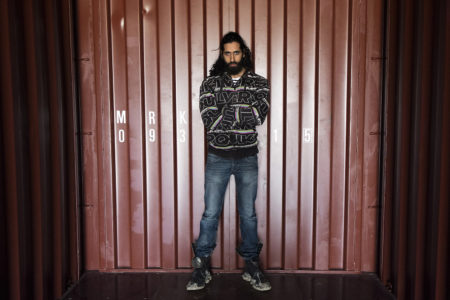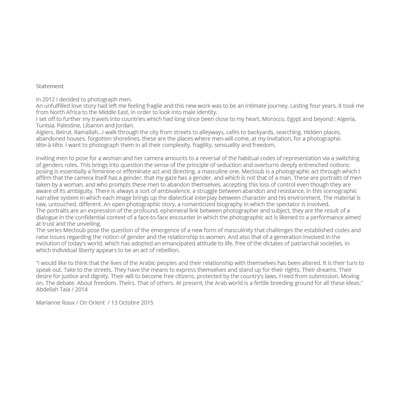







































Mectoub (2012/2016)
(Version française ci-dessous)
Mectoub (2012/2016), is the first chapter of a larger study on new contemporary masculinities, titled: M.
This series won the Leica Oskar Barnack Award 2016.
In 2012, in the wake of the « Arab Springs », I decided to photograph men while traveling in Morocco. Over a four-year period from North Africa to the Middle East (Morocco, Algeria, Tunisia, Palestine, Egypt, Lebanon, and Jordan), I made portraits of a younger generation deeply involved in transforming the world, demonstrating for more individual freedom, and seeking to express who they really are.
“I would like to think that the lives of the Arabic people and their relationship with themselves have been altered. It is their turn to speak out. Take to the streets. They have the means to express themselves and stand up for their rights. Their dreams. Their desire for justice and dignity. Their will to become free citizens, protected by the country’s laws. Freed from submission. Moving on. The debate. About freedom. Theirs. That of others. The Arab world is a fertile breeding ground for all these ideas.”
Abdellah Taïa / 2014
“Mectoub is fascinating because of this unveiling, made possible because the photographer is both female and a foreigner. It plunges us deep into our representations and overturns them. Scarlett Coten holds up these copies for us to see, Homo Orientalis specimens of the new generation, in an unfiltered way, just as they are. The images bring to mind the Egyptian choreographer Hazem Header and his piece “Inside Out” dealing with our roles in society and the balance of power, in which he dances in red stiletto heels. Perched on his red high-heels, his head high in the air, he proclaims to us that man’s freedom will come from that of women. Hazem and all the others are part of these young people that were lauded by the Western media in 2011 because they stood up for their right to exist. Nowadays, nobody is interested in them. They are, however, still there. Mectoub puts them back on center stage with photographs that unsettle us because they show a reality that so many prefer not to see: that of the arab male and all its multiple identities. One of complexity and, in particular, modernity. »
Marianne Roux / On Orient / Octobre 2015
M brings together three series of photographs taken in the Mediterranean basin, Trump’s America and France, that explore contemporary masculinities and the political act inspired by the younger generations’ determination to be and express who they really are.
These photographs are an exploration from a reverse perspective, through the female gaze, of men (assigned as such at birth) who are sowing trouble in gender and freeing themselves from the constraints and pressures of the traditional model; men who are rethinking the notion of identity and redefining masculinity in new and diverse ways.
The trilogy was begun in 2012 to support and highlight a generation who, for over a decade, have shaken the structure of gender and transformed the world’s vision of it. In this project, I took on the challenge of introducing into the collective imagination these singular yet shared experiences and these men’s assertive reinvention of themselves.
At a time when the desire for authenticity, or self-definition, has become a societal issue and the notion of « toxic masculinity » is subverting stereotypical representations, this body of work seeks to shatter the myths and compel us to rethink notions of gender and identity beyond our usual cultural and geographical boundaries.
Mectoub (2012/2016) was begun during the « Arab Spring » uprisings. I traveled to North Africa and the Middle East to explore, in the context of these protests, the emergence of new masculinities in societies where the expression of individual freedom is an act of transgression.
I began Plan Américain (2017/2019) just after the election of President Trump. His encouragement of a hard and retro virility convinced me of the importance of showing the presence of an uninhibited masculinity in an America in crisis where a masculinist nationalism was on the rise.
La Disparition de James Bond (2022/2023) is the third and final chapter of this artistic journey that has taken me to three continents and brought me back to my native country, France. In view of the growing resistance to gender fluidity and social diversity that we are witnessing across Europe, I believed it was important to add this series to give an even stronger voice in support of new masculinities.
For men today, to be vulnerable and speak their truth is an act of rebellion. My work exists to fuel this rebellion.
M is a celebration of openness, adaptability, audacity, an absence of limitations, and a call for empathy, acceptance, and freedom.
Mectoub (2012/2016), est le premier chapitre d’une étude plus vaste sur les nouvelles masculinités contemporaines, intitulée : M.
La série a remporté le Leica Oskar Barnack Award 2016.
En 2012, lors d’un voyage au Maroc et en plein « Printemps arabes », je décide de photographier des hommes. Pendant quatre ans, de l’Afrique du Nord au Moyen-Orient (Maroc, Algérie, Tunisie, Palestine, Égypte, Liban et Jordanie), je réalise les portraits d’une jeune génération profondément impliquée dans les transformations du monde, manifestant pour plus de liberté individuelle et cherchant à exprimer qui elle est vraiment.
M (2012/2023) réunit trois séries qui explorent, du bassin méditerranéen à l’Amérique de Trump et la France d’aujourd’hui, les masculinités contemporaines et l’acte politique qu’induit la volonté d’être soi chez les jeunes générations.
Une exploration envisagée dans un renversement de perspectives, un décentrement : le regard d’une femme sur des hommes (assignés tels à la naissance) qui sèment le trouble dans le genre, s’affranchissent des contraintes et pressions du seul modèle traditionnel, repensent l’identité, multiple, mouvante, et régénèrent la définition de la masculinité.
La trilogie met en lumière, dans un esprit de résistance, une génération qui depuis plus d’une décennie fait vaciller la structure du genre et métamorphose la vision du monde. L’enjeu du projet est d’inscrire ces expériences singulières, mais partagées, cette question de l’invention de soi, combative, dans l’imaginaire collectif.
À une époque où le désir d’authenticité ou d’auto-définition est devenu un enjeu de société, où la notion de « masculinité toxique » fait éclater les représentations stéréotypées, ce travail nous invite à briser des mythes, repenser les notions de genre, d’identité, au-delà de nos frontières culturelles et géographiques. Une volonté de raconter l’histoire de la discrimination d’un point de vue personnel et positif.
Les « Printemps arabes » m’avaient convaincue de la pertinence de révéler, dès 2012, dans le contexte des révoltes, l’émergence de nouvelles masculinités dans des sociétés où la liberté individuelle s’apparente à un acte de transgression (Mectoub 2012/2016).
Fin 2016, l’élection de Trump prônant l’image d’une virilité dure et rétrograde, m’avait convaincue de la nécessité de rendre visible la présence d’une masculinité décomplexée dans une Amérique encourageant un nationalisme masculiniste. (Plan américain 2017/2019).
Aujourd’hui, la « fin de la domination masculine » consécutive au mouvement mondial #MeToo provoque une montée des mouvements « antigenre » opposants une résistance à toute remise en question critique des normes. La ferveur réactionnaire alliée à la recrudescence des discriminations sexistes et de genre auxquelles l’on assiste de par le monde, comme en France, me convainc de l’importance de réaliser un troisième volet français : La disparition de James Bond (2022/2023)
Aujourd’hui pour un homme, dire sa vérité, être vulnérable, est un acte de rébellion. Mon travail existe pour alimenter cette rébellion.
M est une célébration de l’ouverture, la flexibilité, l’audace, l’absence de limites et un plaidoyer pour l’empathie, la tolérance et la liberté.

















































































